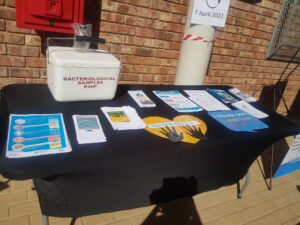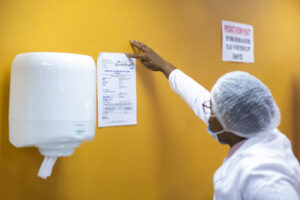10 May 2022 Media Release: Garden Route Air Quality complies 100% with NAEIS
Media Release: Garden Route Air Quality complies 100% with NAEIS
For Immediate Release
10 May 2022
The National Atmospheric Emission Inventory System (NAEIS) is an internet-based emissions reporting system that is a component of the South African Atmospheric Emission Licencing and Inventory System (SAAELIP) portal. The Air Quality Unit of Garden Route District Municipality (GRDM) must ensure that regulated industries, as well as authorities, report atmospheric emissions annually between January and March. This is completed to ensure that a national atmospheric emission inventory profile is in place.
According to Dr Johann Schoeman, Manager: Air Quality: “For the 2022 reporting cycle, GRDM had 37 facilities registered, of which all of them submitted their reports on the system before 31 March 2022. This ensured that the GRDM received a 100% submission rate.” Dr Schoeman says the 100% submission rate was achieved because of “relentless assistance to the industry”. The guidance is provided to the industry through special NAEIS completion target-group sessions, appointments, and personal assistance.
The NAEIS is aimed at providing accurate, current, and complete information on all significant sources of identified atmospheric emissions. This includes greenhouse gas emissions from South Africa. The information is used to inform policy formulation, for the Republic of South Africa to meet its obligations under the United Framework Convention on Climate Change and any other international treaties.
WHO SHOULD REPORT TO NAEIS?
Three groups of data providers are required to report to NAEIS, as listed below:
- Listed activity in terms of Section 21(1) of the National Environment Management: Air Quality Act 39 of 2004 (the Act).
- Controlled emitters: Section 23(1) of the Act.
- Mines: Mineral and Petroleum Resources Development Act, 2002 (Act No. 28 of 2002).
ARE THERE ANY PENALTIES FOR NOT REPORTING INTO NAEIS WITHIN THE PRESCRIBED PERIOD? WHAT IS THE FINE FOR NON-COMPLIANCE?
A person guilty of an offence in terms of NAEIS Reporting Regulations is liable, in the case of a first conviction, to a fine not exceeding R5 million. A person can also be imprisoned for up to five (5) years. In the case of a second or subsequent conviction, a person can receive a fine not exceeding R10 million or be imprisoned for up to 10 years.
National Emission Reporting regulations that prescribe NAEIS reporting can be downloaded from https://www.environment.gov.za/legislation/actsregulations.
Feature Image: Dr Johann Schoeman (Manager: District Air Quality Management), , Anelisa Fuzani (Environmental Health Practitioner), Sam Bendle (Chief: Municipal Health Services – Mossel Bay), Angus Andries (District Air Quality Officer)
ENDS






















